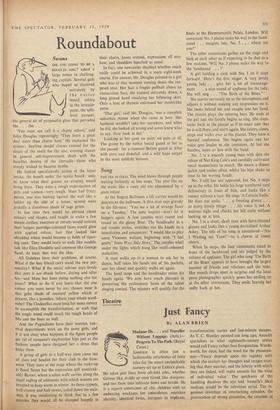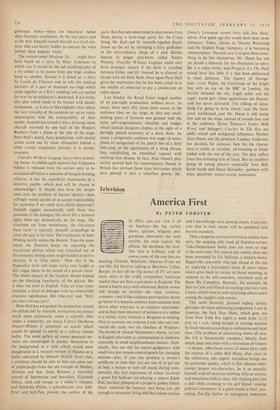Theatre
Just Fancy
By ALAN BRIEN
Madame De . . . and Traveller Without Luggage. (Arts.)— Progress To The Park. (Royal Court.) ANOUILII is often just a fashionable refurbisher of fairy tales for the smart unshockable nursery set up at Lolita's place. He takes plot lines from oft-told tales, whether Grimm like Ardele or even Greek like Antigone, and ties them into intricate bows and braids. He is a superb entertainer of chic children with an endearing weakness for coincidence, mistaken identity, identical twins, intrigues in triplicate, transformation scenes and last-minute escapes. As T. C. Worsley pointed' out long ago, Anouilh specialises in what eighteenth-century critics would call Fancy rather than Imagination. Words- worth, for once, had the word for the phenome- non—Taney depends upon the rapidity with which she scatters her thoughts and images trust- ing that their number, and the felicity with which they are linked, will make amends for the want of individual value.' The quickness of the handling deceives the eye and Anouilh's ideal medium would be the television serial. The in- genious invention of interlocking episodes, the provocation of strong situations, the creation of grotesque extras—these are theatrical rather than dramatic excellences. In the two plays now at the Arts Anouilh reveals himself as a tired con- jurer who can barely bother to conceal the wires behind these popular tricks.
The curtain-raiser Madame De . . . might have beeh based on a story by Hans Andersen—in which case it would be the sad autobiography of a tin soldier as he passes from one huge careless hand to another. Instead it is based on a story by Louise de Vilmorin and so tells the madcap memoirs of a pair of diamond ear-rings which come together at a flirt's wedding and are parted for ever by an adulteress's death bed. It is a lively, silly plot which needs to be treated with deadly seriousness : as it was in Max Ophuls's film, where the very triviality of the incidents set up an ironic counterpoint with the irrevocability of their results. Anouilh has turned it into a drawing-room charade narrated by one half of the Western Brothers from a piano at the side of the stage. Peter Hall's dainty, fussy production, with several scenes acted out by silent silhouettes behind a white screen, exquisitely matches it in preten- tiousness.
Traveller Without Luggage has a more promis- ing theme. A middle-aged memory-less Unknown Soldier is released from his asylum only to be auctioned off before a selection of bargain-hunting relatives. It has the superficial excitements of a detective puzzle—which past will he choose to acknowledge? It should also have the deeper roots into the problem of human identity—how willingly would anyone of us accept responsibility for yesterday if we could start afresh tomorrow? Anouilh juggles, occasionally with these two questions in his dialogue, but never for a moment . lights them out dramatically on the stage. The situations are from melodrama, the characters from farce—a typically Anouilh camouflage to cover the gap in his lines. The translation of John Whiting hardly assists the illusion. Take the scene where the Duchess keeps on repeating the mysterious phrase which was wrenched out of the amnesiac during some rough-handed primitive analysis. It is 'little pisser.' Now this is the Pygmalion trick and reaps many easy laughs at this vulgar idiom in the mouth of a grande dame. The whole impact of the incident should depend on the shocking familiarity of the phrase. But it does not exist in English. Take an even tinier example, a sliver of dialogue with no conceivable dramatic significance. But who ever said, 'Well, yes, that is to say, yes'?
Peter Hall has not guided the production around the pitfalls left by Anouilh. Aristocrats are always much more aristocratic under a republic than under a monarchy, yet Joyce Carey's Duchesse Dupont-Dufort is permitted an accent which would be spotted as non-4.1 in a railway station buffet. The usual gallery of comic postcard ser- vants are encouraged to parody themselves in the background in a style which would seem exaggerated in a musical version of Plautus or a ballet conceived by Donald McGill. Even then, a producer should be able to beat out some sort of jingle-jangle from the old triangle of Mother, Mistress and Son. Irene Browne, a mournful mound of bombazine and horsehair, Elizabeth Sellars, dark and savage as a collier's whippet, and Denholm Elliott, a schoolboyish satyr half- Peter and half-Pan, provide the outline of the• parts. But they are condemned to play scenes from Ibsen during a back-stage party for the Crazy Gang. Mr. Hall and M. Anouilh together finally break up the act by springing a fairy godfather in the extraordinary shape of a pink Belisha beacon in ginger plus-fours called Maitre Picwick. Traveller Without Luggage could only have dramatic stature if the hero is crucified between Either and Or. Instead he is allowed to escape with the Holy Both. Once again Peter Hall gives the impression that he has been called in in the middle of rehearsal to put a production on roller skates.
Last Sunday the Royal Court staged another of its one-night productions without decor. As usual, there were fifty times more actors in the audience than on the stage, so that any small, striking piece of business was greeted with the same self-congratulatory chuckles and nudges which fashion designers display at the sight of a daringly placed accessory at a dress show. As usual, a progressive audience was eager to sema- phore its recognition of the punch line of a dirty folk-song, or the significance of a slang phrase, thus establishing an emotional rapport with working-class drama. In fact, Alun Owen's play merely proved how far contemporary theatre in Britain has stormed those class barricades which once penned it into a suburban ghetto. Mr. Owen's Liverpool corner boys talk_ like them- selves. Five years ago this would have been revo- lutionary. Today, thanks to Theatre Workshop and the English Stage Company, it is becoming commonplace. The task now is to give them some- thing to do like themselves. Mr. Owen has not yet found a dilemma for his characters to solve. He is a radio writer, and Progress To The Park would have lost little if it had been performed in total darkness. The bigotry of Orange- man versus Papist, the frustration of the bright boy with an eye on the BBC in London, the barrier between the shy, frigid sailor and the eager, warm girl—these oppositions are illumin- ated but never activated. 'I'm talking of some- thing I'm going to write about,' says the back- street intellectual, and Mr. Owen is still inside him and on the stage, instead of outside him and in the audience. Dylan Thomas's Under Milk Wood and Salinger's Catcher In The Rye are oddly mixed and undigested influences. Neither Alun Owen, nor the producer Lindsay Anderson, has decided, for instance, how far the chorus- hero is visible or invisible, all-knowing or blind- folded with the rest of the cast. The play suffers from this irritating lack of focus. But an excellent group of young players—especially Tom Bell, Keith Smith and Donal Donnelly—perform with often positively embarrassing naturalism.







































 Previous page
Previous page